Tribute
GD Shah: Taking EEPC India to new shores
Former Chairman of the Engineering Export Promotion Council (now EEPC India), Mr Ghanshyam Das Shah, popularly known as GD, passed away in Kolkata on 22 August 2023. As one of its longest-serving and active members, GD participated in EEPC affairs with rare distinction his whole life. He was also the founder of the Nipha Group, established in 1963.
GD served as the Council’s Regional Chairman (Eastern Region) for some years and became Chairman in 1979, his tenure lasting till 1982. His term coincided with a crucial period in global development, as winds of change were sweeping across the world seeking more liberalised and open economies. For India, foreign exchange was scarce and it desperately needed more exports to shore up reserves. As the Council’s Chairman, GD accepted the challenge to take India’s exports to new heights, and the outcome of that endeavour is there for all to see in EEPC India’s success story.
1981-82 was a momentous year in the history of the Council. Its Silver Jubilee was celebrated on 17 August 1981 with GD at the helm. The landmark occasion was graced by the presence of then President Neelam Sanjiva Reddy and Pranab Mukherjee, then a strongman in the Indira Gandhi government, among other luminaries. The commemorative issue of the Council’s overseas journal, Indian Engineering Exporter, was published on the occasion of the Silver Jubilee in July 1981.
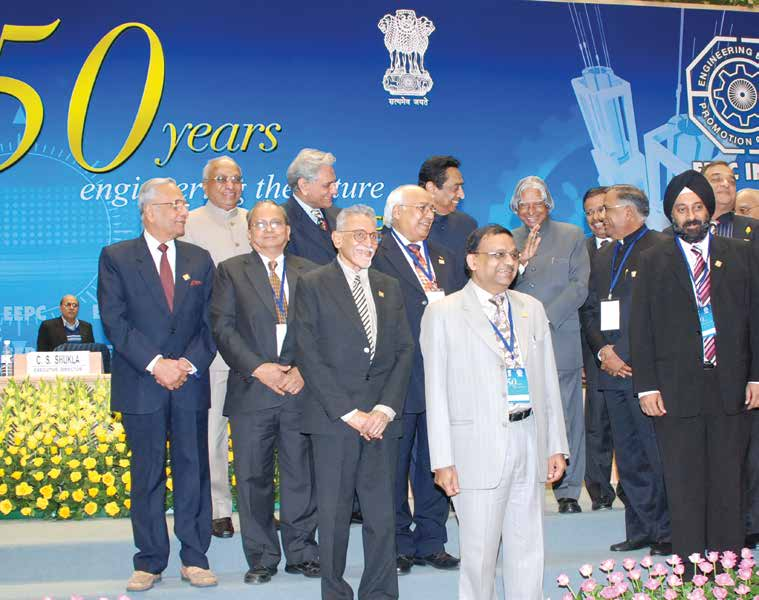
The Council had just made a beginning with its flagship exhibition, INDEE, the first being held in Singapore in 1977, and it was during GD’s tenure that it opened up to more interactions, exchanges, and markets abroad. INDEE 79, the second whollyowned engineering xhibition, was organised at Jakarta, Indonesia in March 1979 with the participation of nearly 250 member firms; and the third INDEE was held in Bangkok in January 1981, primarily to tap the growing markets of the Southeast Asian region in general and the ASEAN region in particular
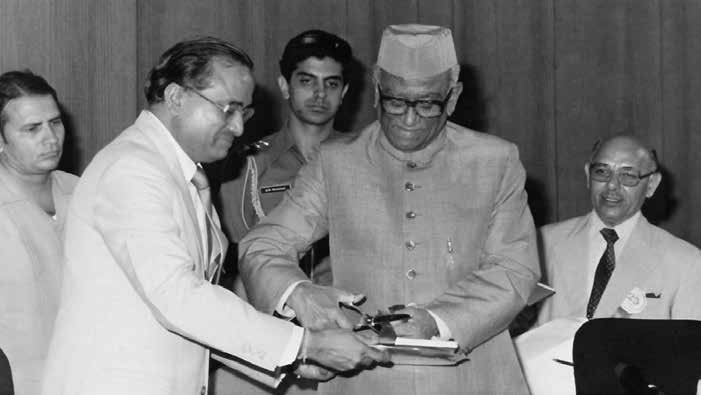
Mr GD Shah with past Chairmen and India’s President, Neelam Sanjiva Reddy at EEPC India's Silver Jubilee celebrations in 1980
GD’s era witnessed a visible expansion in overseas activities. The Council’s 10th foreign office was opened in Jakarta and then one in Vienna, and there were heightened interactions with foreign buyers. It was a period that saw India step up its exports to the world with focus on the country’s engineering expertise.
High-level exchanges were initiated with European countries such as West Germany, Sweden, and Belgium, among others. Two conferences were held on Joint Tendering and Sub-Contracting: the Indo-European Conference, Paris 1980; and Indo-Japan Conference, Tokyo 1982.
Steel was a big issue in the early 1980s, as it is today. GD worked relentlessly with the authorities for easier availability of quality steel to manufacturers and exporters. He was the mastermind in drafting the International Price Reimbursement Scheme (IPRS) with former Steel Secretary PK Kaul and former President Pranab Mukherjee, who had an abiding interest in steel.
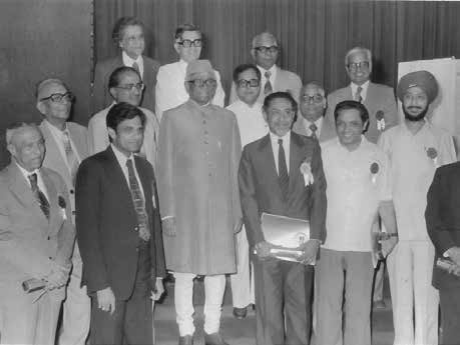
Mr GD Shah (second from the left in the middle row) with India’s President, Neelam Sanjiva Reddy at the 25th anniversary celebrations of EEPC India in 1980

Mr GD Shah (extreme left in the last row) with past Chairmen and India’s President, Dr A P J Abdul Kalam at the Golden Jubilee celebrations in 2005
Born on 17 January 1937 in a small town in Rajasthan’s hinterland, GD originally came to Calcutta for higher studies at the behest of his father, Madan Lal Shah. Madan Lal, a lawyer, had visited Calcutta in his youth and fell in love with the city he lived and studied in. He was the first person in Jhunjhunu district to have done higher studies in English.
GD had graduated from Maharaja’s College, Jaipur, in 1955. He was 18 years old and married when he left home. On arriving in Calcutta, GD enrolled both at Calcutta University to study Law and the Institute of Cost and Works Accountants of India to study Cost Accountancy. To support himself financially, GD took up a job in Texmaco Limited (then Textile Machinery Manufacturers’ Corporation Limited) in Belghoria. Those were trying times for the young man from Jhunjhunu, juggling study and work at the same time. It was a difficult commute to Belghoria, a suburb of Calcutta. Needless to say, the new job affected his studies and GD could only clear Intermediate Law and the final of the first part of the Cost Accountancy course before he chose his career over studies.
GD’s assignments in various departments of Texmaco – Stores, Purchase and Company Secretary – helped him to thoroughly comprehend the workings of the mechanical engineering industry. Along with garnering knowledge on machinery, GD was also looking for ways to start his own business enterprise as his father wished.
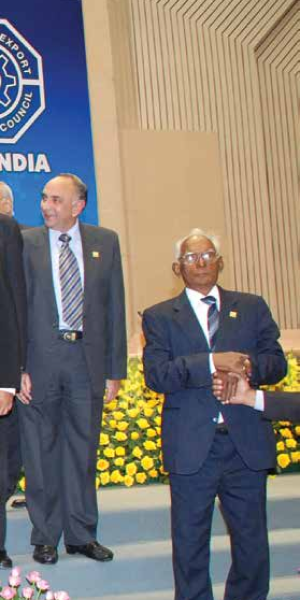
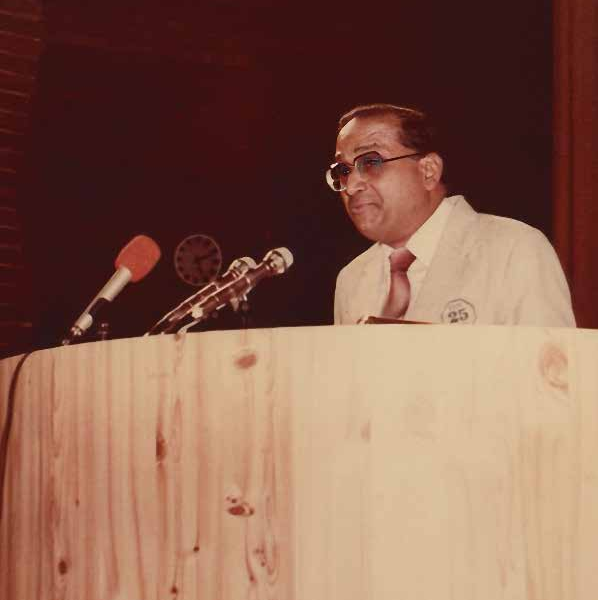
Mr GD Shah speaking at the Silver Jubilee celebrations of EEPC India in 1980
And the time came soon enough. At that time, Texmaco was importing industrial plugs and sockets from Niphan, a British company. Fired with a desire for import substitution, GD took samples of these plugs and sockets, got them manufactured and began marketing them. As a name for the newly-launched venture, he borrowed the name of the British company, just dropping the last letter. The first letterhead of Nipha Engineers had a plug-and-socket logo.
And so, quietly and without fanfare, ‘Nipha’ was born. No one could envisage the phenomenal growth of the company then.
As the years went by, like many companies, Nipha had its share of ups and downs. But it weathered the various storms, including a devastating fire on New Year’s Eve of 1994 that gutted its office and destroyed all its records, technical drawings and contract documents, to grow stronger than ever.
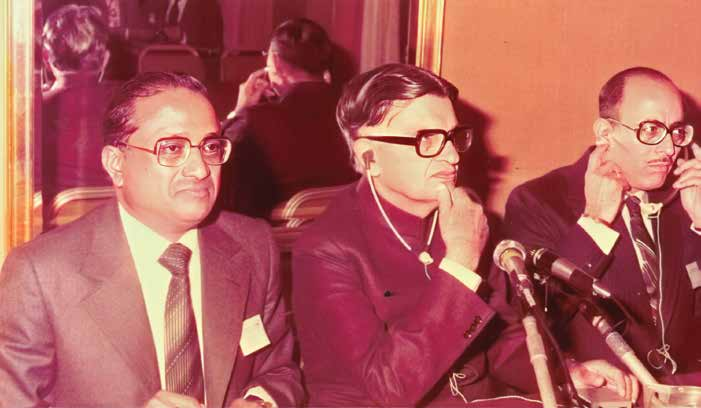
Mr GD Shah at the Indo-European Conference on Joint Tendering and Sub-Contracting, Paris 1980
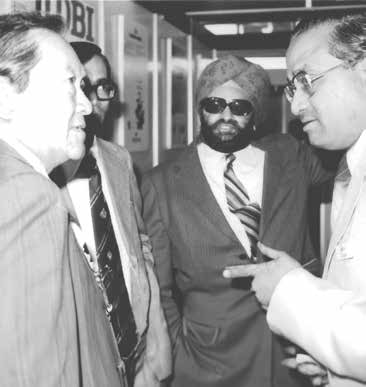
Chairman GD Shah in conversation with exhibitors at the 3rd INDEE in Bangkok, January 1981
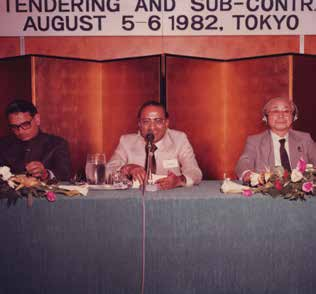
Chairman GD Shah at the Indo-Japan Conference on Joint Tendering and Sub-Contracting, Tokyo 1982
Initially GD took advantage of the jute boom of the 1950s and 60s to set up his own small factory in 1962 to manufacture wide looms to weave hessian and got a foothold in Africa to supply them to a company in Uganda. Later, Uganda opened doors to the company’s cotton ginning business where it explored the tough territories of Tanzania and Uganda to establish cotton ginning turnkey projects. So began Nipha’s journey in the world of exports.
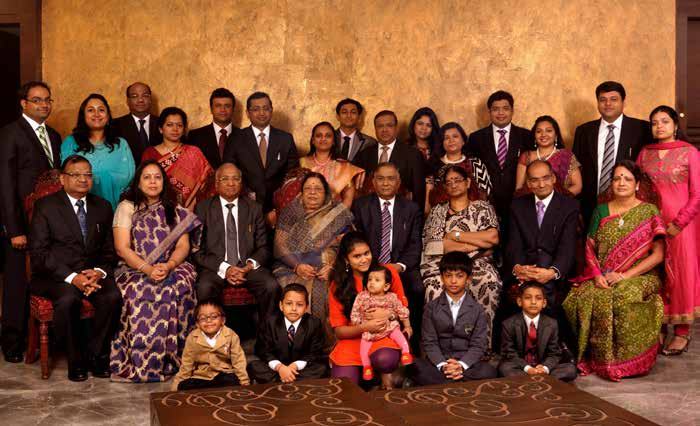
Mr GD Shah with his family
GD was driven by two great desires – his love for his family and love for his country. The first was fulfilled when his brothers, Mahesh, Pawan, and Ramesh grew up and joined him in Calcutta; and the second was fulfilled when Nipha received an order from the Ministry of Defence to produce clip cartridges during the Indo-Pak was of 1971. Nipha grew from strength to strength, diversifying production in machinery and equipment and increasing exports while family members joined the company as they grew up. And they are all members of EEPC India. GD’s sons, Rakesh and Anupam, are former Chairmen of EEPC India.
The Shah family believes in giving back to the community that has nurtured them; and the project closest to the family’s heart is the JB Shah Girls’ (Post-graduate) College, founded by Madan Lal Shah in 1982. It is the first women’s college in Jhunjhunu, Rajasthan. Set in a sprawling 10-acre campus, the family faithfully nurtures this college with financial help through their Charitable Trust and also provides strategic support by being involved in key management decisions.
EEPC India joins the Shah family in remembering GD Shah and celebrating a life well lived. The essence of GD Shah’s life echoes the theme of India’s G20 Presidency – ‘One Earth, One Family, One Future!’







